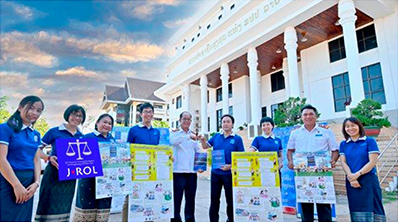2 Sharing Universal Values and Realizing a Peaceful and Secure Society
2-1 Assistance for Realizing an Equitable and Inclusive Society
(1) Technical Assistance for the Improvement of Legal, Judicial, and Economic Systems
In order to achieve “quality growth” in developing countries, it is necessary to equip them with social infrastructure that is equitably and stably managed, so that the rights of individuals are guaranteed, and people can be engaged in socioeconomic activities with a sense of safety. To strengthen such foundations in developing countries, the sharing of universal values, such as freedom, democracy, respect for basic human rights, and the rule of law, realizing good governance, and ensuring peace, stability, and security are of great importance.
In this regard, it is necessary to provide developing countries with legal technical assistance, including support for advancing legislation, improving legal practice, and training legal and judicial personnel (including legal professionals and staff engaged in correction and rehabilitation services). In addition, support is required for the development of economic systems, including human resources, which should include the establishment of taxation systems, appropriate tax collection, management, and execution, enhancement of audit functions of the public sector, and improvement of financial systems.
● Japan’s Efforts

Judges of the People’s Supreme Court of Laos and a JICA expert holding up the Civil Code enacted in 2018 with Japanese assistance under the “Project for Promoting the Development and Strengthening of the Rule of Law in the Legal Sector of Lao P.D.R.” and a poster for the announcement (Photo: JICA)
Japan provides assistance for the development of legal and judicial systems and economic systems in countries such as Bangladesh, Cambodia, Indonesia, Laos, Mongolia, Nepal, Sierra Leone, Sri Lanka, Timor-Leste, Uzbekistan, and Viet Nam. The assistance includes legal and judicial system reform, drafting of laws and regulations, capacity development of national and local government officials for the operation and execution of legal systems, enhancement of internal audits, and establishment of civil codes, competition law, intellectual property law, tax, internal audit, and public investment systems. In particular, in Laos, as a result of Japan’s continuous support over more than 20 years for the development of legal and judicial systems, the country’s first civil code entered into force in May 2020, and currently, support for the operation of the civil code is being provided. In Indonesia, a collection of judgments (trademark cases edition) for judges who mainly deal with intellectual property cases was published in March 2022. Furthermore, in July of the same year, the “Question and Answer Book on the Establishment of Regional Regulations and Regional Head Regulations,” a set of reference materials for government officials in charge of drafting and reviewing laws and regulations, was published. These publications are widely used for the capacity building of legal practitioners and other related professionals in the country.
The development of legal and judicial systems and economic systems in developing countries, as well as the development of human resources capable of properly operating those systems, will lead to improvements in the business environment for Japanese companies to operate in these countries. Japan’s assistance for the development of legal and judicial systems and economic systems, drawing on Japan’s “soft power,” promotes and underpins growth in the world, including Asia.
In response to the “Kyoto Declaration” Note 35 adopted at the 14th UN Congress on Crime Prevention and Criminal Justice (Kyoto Congress) Note 36 held in Kyoto in March 2021, Japan actively conducts follow-up activities to materialize the declaration. Specifically, Japan leads the formulation of UN Standards and Norms on Reducing Reoffending by utilizing knowledge of reducing reoffending through Japanese public-private partnerships. In addition, Japan takes initiatives of regularly holding related forums, such as the “Global Youth Forum for a Culture of Lawfulness” (Col-YF) with the aim of empowering young people who will lead the next generation, and the “Criminal Justice Forum for Asia and the Pacific” (Crim-AP), an information-sharing platform to further promote international cooperation for criminal justice practitioners in the Asia-Pacific region.
With regard to capacity building assistance for national and local public officials to operate and enforce legal and judicial systems, Japan conducts international training courses, studies, and local seminars, specifically with the aim of strengthening the development of human resources, such as legal practitioners. In 2022, as it had been in 2021, it was still difficult to conduct training in Japan due to restrictions on the new entry of foreign nationals to Japan posed by the COVID-19 pandemic. Because of this situation, Japan conducted online training on topics such as drafting laws and legislation, operation of legal and judicial systems, and legal professional nurture in accordance with the needs of the above-mentioned countries. The training was attended by legal practitioners and lawmaking professionals including justice ministry officials, judges, and prosecutors from these countries. Additionally, Japan sent legal professionals to face-to-face seminars and workshops held locally to give lectures.
Furthermore, in order to proactively promote assistance aligned with the needs of developing countries, Japan works to implement effective assistance by conducting broad and basic studies regarding the legal systems of the countries, and their interpretations and operations. As one of the efforts, since April 2022, Japan regularly holds the “Asia-Pacific Real Estate Legislation Study Group” as a forum for conducting comparative research on real estate legal systems in Cambodia, Indonesia, Laos, and the Philippines.
- Note 35: An outcome document of the Kyoto Congress that provides medium- to long-term guidelines for the UN and UN Member States in the field of crime prevention and criminal justice.
- Note 36: The largest UN international conference in the field of crime prevention and criminal justice, held once every five years. The United Nations Office on Drugs and Crime (UNODC) serves as the secretariat of the conference.
